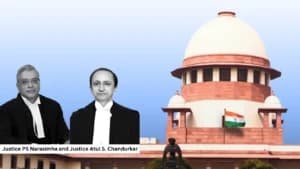In a significant observation, the Supreme Court of India on Thursday suggested that unopposed candidates in elections should be required to secure a minimum percentage of votes to be declared winners. The court was hearing a Public Interest Litigation (PIL) filed by the Vidhi Centre for Legal Policy challenging the validity of Section 53(2) of the Representation of the People Act, 1951.
Section 53(2) allows candidates to be declared elected without a poll if they are unopposed. The petitioner argued that this deprives voters of their right to reject all candidates through the NOTA (None of the Above) option.
During the hearing, a bench of Justices Surya Kant and N Kotiswar Singh highlighted concerns about democratic fairness in uncontested elections. Senior Advocate Arvind P. Datar, appearing for the petitioner, pointed out that while the Election Commission reported only 9 such cases, many unopposed victories occurred in state assemblies.
Read Also:- Supreme Court Directs Petitioners to Submit Voter Turnout Data Concerns to Election Commission
Justice Kant observed:
"Creating a mechanism that requires unopposed candidates to secure at least 10% or 15% of the votes would be a progressive step... Otherwise, voters are left with no choice."
Datar emphasized that in hypothetical situations where all other candidates withdraw, the remaining candidate may be undesirable, but the voters have no option except to accept the result. He questioned if democracy is served when even a minimal share of votes isn't required for such candidates.
Justice Kant supported this view:
"If one candidate remains and is elected by default, voters are helpless. This system weakens democratic participation."
Senior Advocate Rakesh Dwivedi, for the Election Commission, noted that in the last 25 years, only one unopposed victory occurred in Parliament. He argued that broader electoral reforms should be left to Parliament.
Read Also:- Supreme Court Dismisses Plea Demanding 100% Manual Counting of VVPAT Slips in Elections
The Attorney General R. Venkataramani echoed this, stating the desirability of such reforms should not lead to invalidating existing laws. Justice Kant clarified the Court isn't striking down laws but only suggesting thoughtful reforms:
"We are not declaring anything unconstitutional. We are suggesting that the government consider adding an enabling provision."
The Court suggested forming an expert committee to study the feasibility of such a reform. Time was granted to the Union to respond with a detailed affidavit.
The petitioner also challenged Rule 11 of the Conduct of Election Rules, 1961, and Forms 21 and 21B, which formalize the process of declaring unopposed winners.
The plea cited the 2019 Surat Lok Sabha case where a candidate was declared elected unopposed and argued that this practice undermines voter choice and Article 19(1)(a) of the Constitution, as upheld in People’s Union for Civil Liberties v. Union of India (2013).
Case Title: VIDHI CENTRE FOR LEGAL POLICY Versus UNION OF INDIA AND ANR., W.P.(C) No. 677/2024















